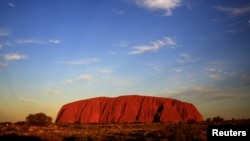Australia's most famous rock — the monolith known as Uluru — will be closed to hikers and climbers starting in 2019, after years of campaigning by the aboriginal peoples of the area who consider it a sacred spot.
The Uluru-Kata Tjuta National Park Board, made up of aboriginal owners and National Park representatives, announced the decision Wednesday.
The closure will take place on a significant date: Oct. 26, 2019, the anniversary of the 1985 handover of the rock from the government back to the aboriginal people known as the Anangu.
The world’s largest monolith, formerly known as Ayers Rock, is one of Australia’s most famous sights. Those concerned about Uluru say they worried that tourism was physically damaging the giant red outcropping and also creating a “theme park” atmosphere in a place holy to the Anangu.
Statistics from Parks Australia indicate that the number of people who climb the rock has declined in recent years, despite drawing some 300,000 visitors per year. Only 16 percent of visitors climbed the rock between 2011 and 2015, compared to some 74 percent in the 1990s.













